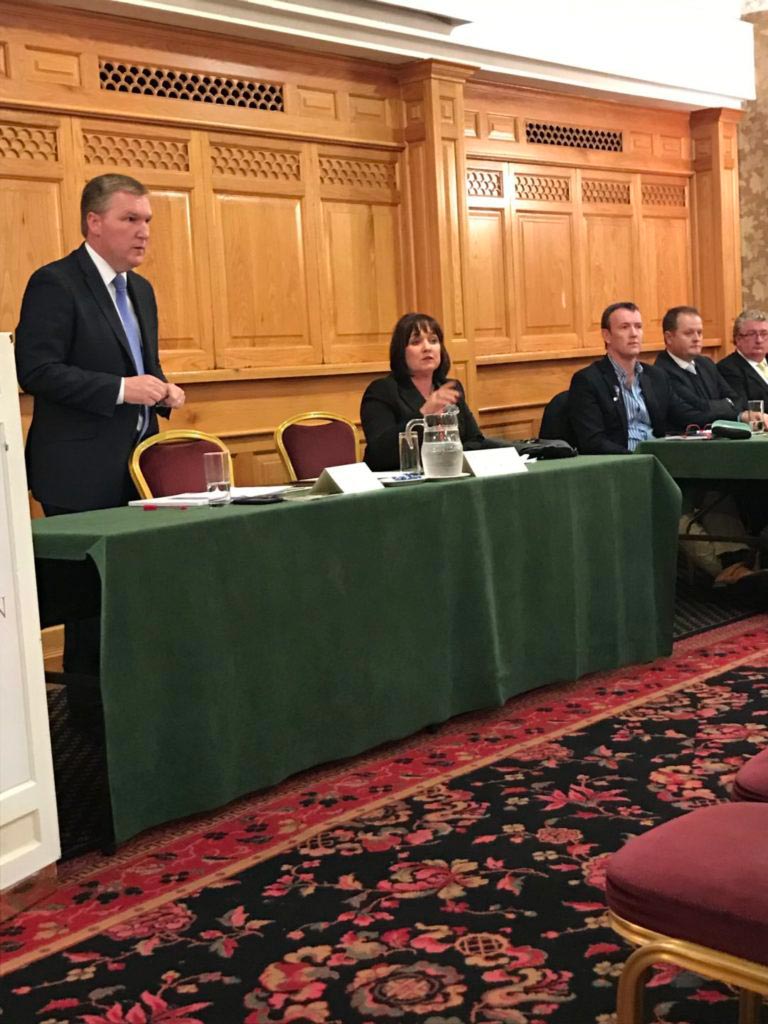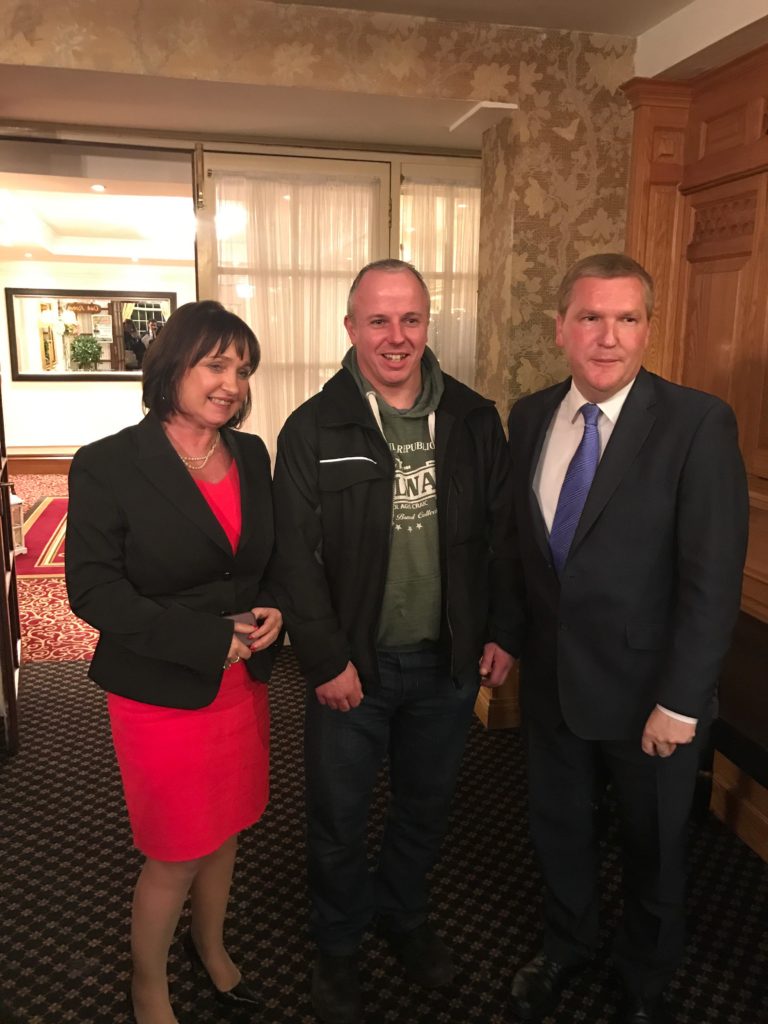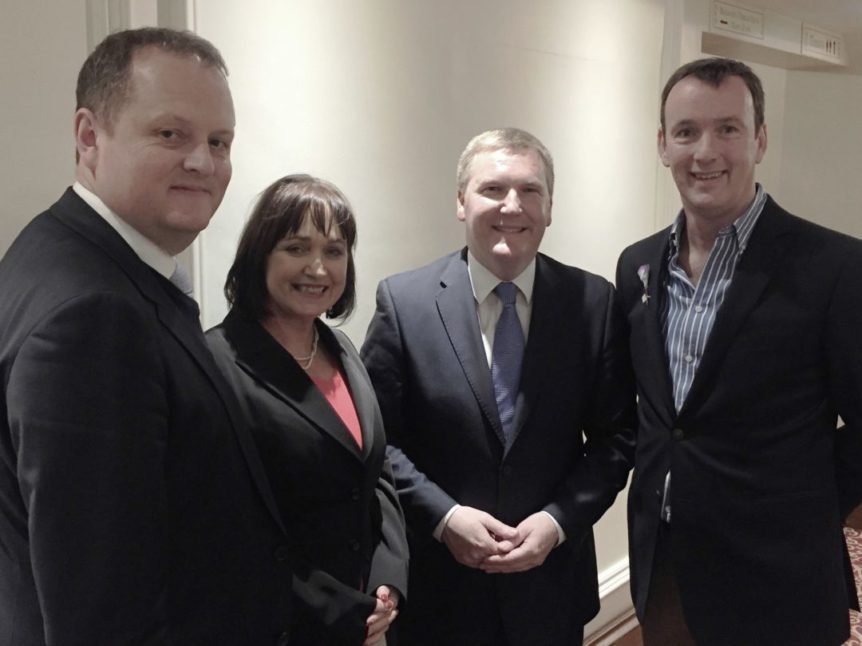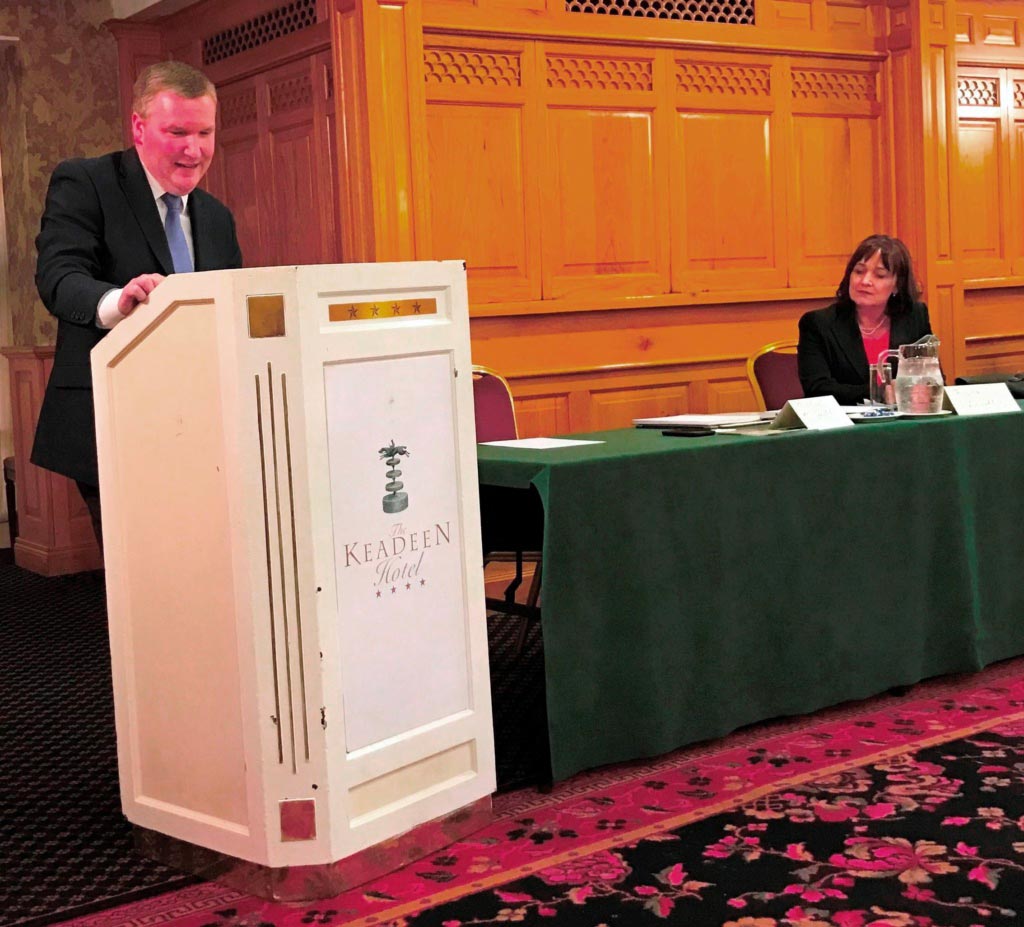I hosted my first public meeting on Thursday, 17th November since my election to Dáil Eireann. I was delighted to have Fianna Fáil Spokesperon on Finance, Deputy Michael McGrath and renowned financial experts in Co Kildare, Barry Fitzsimons (also President of Rotary Newbridge) and John McCormack of Rebate Insolvency Solutions. Many thanks to Wilfie Cronin, Chairperson South Kildare Comhairle Dáil Ceanntar and committee members Ger Elwood and Anne Connolly, and Cllr Murty Aspell for attending.

This meeting was the first in a series of meetings I hope to host entitled ‘Living in Kildare’. We covered finance issues and the impact of Budget 2017 and of course, Brexit which as yet, we can’t be sure how much that will affect the Irish economy long-term.
We still have the lowest ratio of Gardaí per head of population here, the lowest investment in mental health and despite having one of the youngest age population in the country, we have one of the lowest investment in children and youth support services. Thankfully, a €5.5m investment in psychiatric services in Co Kildare has been confirmed this week.
We have great potential for further business and housing build, with super road networks. And yet, 50 per cent of all Kildare workers are employed outside of the county.
Government Formation
Deputy McGrath spoke on the background to Govt formation.
“Historic cross party agreement – not sure yet as to how successful it will be, the jury still out on that one! FF fought the election on the disconnect of FG-LAB Govt on health, disability services, education, career guidance, further investment badly needed in Gardaí. We took the message on the need for more support services to the electorate.
“Cost of living has increased for Irish people in every aspect of daily living. In terms of motor insurance, FF’s motion led to Govt establishing the Task Force to tackle huge increases in Motor Insurance with 40 recommendations on how to curb the ridiculous increases in motor insurance, fraudulent claims, etc” said Deputy McGrath.
On Housing, total lack of social and affordable housing, FF brought a nunber of ideas to Govt through Finance Bill for realistic costing of building houses to meet the current needs.
“Who would have envisaged the Brexit vote, Donald Trump elected in the US and the public pay crisis. The Lansdowne Agreement still has time to run so we are facing a huge era of uncertainty. A fall in Sterling has had an impact, especially regard to NI and exports. We will be advocating free trade between Ireland and the UK, as we have more at stake than any other country in the EU”.
Supporting SMEs
Deputy McGrath addressed the issue of Capital Investment and stated FF was very pro Enterprise and have pushed the Govt for meetings on issues facing the self-employed.
“SMEs should be afforded the same supports as PRSI workers, should they fall ill or experience difficult times. We’ve seen a moderate improvement in CTGs, those who support, invest and provide employment within their communities but still have a merging rate of tax”.
There are 7,774 SMEs currently operating in Co Kildare and I believe these are the lifeblood of our communities – so please, where possible, use local service providers and shop local! Every euro spent locally generates €4 for the local economy.

Motor Insurance
Motor Insurance was a topic raised by Newbridge man, Joe O’Reilly, a taxi driver who paid €940 a couple of years ago to run his standard Passat 2 lr engine as a taxi.
Joe claimed that Last year, it cost him €1,200 but this year, he was quoted €1,800! One insurance broker in Naas quoted him over €3,000. Understandably frustrated, he asked “Are they pulling these figures out of the air! Is there no way we can put a cap on the annual increases in motor insurance costs?”
Pensions
Barry Fitzsimons spoke at length on this issue: “Ireland has a major issue in relation to pensions, we will hear lots about it in the future. We have an aging population with little or no provision to fund future pension liabilities. Charlie McCreevy provided €20bn for this cause up to 10 years ago now it’s being diverted to fund banks and some other strategic fund. State pensions are funded out of tax receipts and there is no future funding like any occupational pension scheme would.
As a result, there will be huge pressure on future governments to fund our generation as we come close to retirement. We all need to bear this in mind and start our own as soon as…. it is my opinion that the next generation will have pensions similar to the current amount, in other words, without indexation factor to provide for increase in the cost of living”.
Barry advised that small service companies can use their company to fund a pension for themselves. In other words, they can use company profits to fund a pension that is very tax efficient. He further noted that the Govt have pledged to reduce the DIRT threshold from 41% to 39% and by 2% to 33% over the next 4 years.
He felt that the over 60’s who had accumulated some savings over their life were at a major disadvantage with the reduction of interest rates on their saving to near zero. He stated there are other low risk investment options available but these carry the current rate of exit tax at 41% and this is an area that needs to be looked at.
Public Pay Sector
Deputy McGrath claimed we have to be careful about this: “Cost of Lansdowne Road agreement is provided for, for next year but after that, nothing! It’s all very fine saying we need to get into negotiations but if wages are to be increased, the money has to found to support it. The notion that we can have a new public sector pay agreement in early 2017 in not tenable. Some of pay restoration still hasn’t come into effect but for full restoration – the debate needs to be honest, where will the money come from?”
The plight of SMEs was further discussed with the options as to whether to be a sole trader or a limited company aired.
Inequality of State Pensions for Women
State pensions were then aired with several women in the audience who have experienced a shortfall in their pension payments. One woman stated she felt victimised and penalised for going out to work. “I reared my family, then when they were older I went out to work, for a government Department. When my PRSI contributions were assessed, I received a reduced pension but my friend who never worked outside the home receives the full amount! I don’t know what Joan Burton had against women when she changed the application process for pension but I’d like to thank you Fiona O’Loughlin for being the first TD to raise the matter in the Dáil”
Newbridge native Anne was experiencing a similar situation and stated “The pension is not a Social Welfare handout – It’s a pension we’ve all paid into over the years!” I concur with Anne totally and feel strongly that the calculation method needs urgently to be changed.
Homemakers 1994 recognised women in the workforce but Joan Burton in Govt changed that in 2012. I have to say I personally was shocked when it was introduced – it is causing considerable stress to so many constituents, women who’ve come into my office with pensions reduced from €30-80 per week. It’s not fair and as Liz stated earlier, penalising women who worked after rearing their families or took time out as carers.
Deputy McGrath further noted that in years to come the pension age will likely be pushed back to 68 so as stated earlier, young people need to start saving now! ”The cost of living is creeping up in every area: children’s health care, motor and health insurance, childcare costs, public transport, etc. So gloomy as it sounds, we need to provide for our future”.
Barry Fitzsimons and another attendee felt we need to talk up the economy, there’s too much doom and gloom out there. Barry felt the UK pound is likely to get strong again and that he had held a meeting lately with an official from one of the biggest banks in the world who said they would seriously consider moving their base from Scotland to Ireland.
John McCormack however, warned he was worried that British companies might bail out, with advisors fearing Ireland is too close to the UK to survive without it, and that we might consider exiting the EU in the future too.
It was generally agreed though that a Minister should be designated to tackle the Brexit impact.
I’d like to thank the attendance, my guest speakers and FF CDC members for attending. Michael, Barry and John have given us some insightful knowledge into the financial landscape ahead and we have changing times ahead. But I’m going to take a leaf out of Peter McVerry’s book which I read recently. He stated we should never be afraid of the future as it’s merely the ongoing present.


